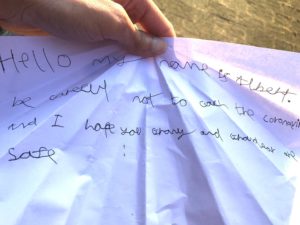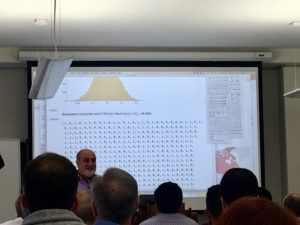Life and spirituality journal
30 May 2024: Practice
If you are relying on a schedule to force you to practice (act) — you are actually practising to schedule, not scheduling to practice.
Practice (action) must be for its own sake.
23 April 2024: The bureaucratic mind
5 signs you are working with an intolerable bureaucrat:
1. They are obsessed with rules over the actual work itself.
2. They are incapable of first principles thinking.
3. They use jargon and long sentences that they regurgitate like parrots.
4. They (secretly) despise you for doing interesting work.
5. They are very boring and put you to sleep.
20 March 2024: Patience
During any discussion/debate, simply remembering that what’s very obvious to you may be quite alien to the other, can help us engage with more patience and ultimately, be more effective.
5 March 2024: We must go on
“There was no solution, but that universal solution which life gives to all questions, even the most complex and insoluble. That answer is: one must live in the needs of the day —that is, forget oneself.” — Tolstoy
2 April 2023: Notes on the Peter Principle
The Peter Principle (1969) is a timeless classic that explores the roots of management incompetence. It somehow manages to be a work of philosophy, organisational psychology and satire all at once! A few nuggets:
The Principle:
“In a hierarchy every employee tends to rise to his level of incompetence.”
“One may win a promotion or two, but their final promotion is from a level of competence to a level of incompetence.”
Corollary:
“In time, every post tends to be occupied by an employee who is incompetent to carry out his duties.”
The question of standards:
“The competence of an employee is determined not by outsiders, but by his superior in the hierarchy. If his superior is still at a level of competence, he may evaluate his subordinates in terms of performance of useful work. But, if the superior has reached a level of incompetence, he will probably rate his subordinates in terms of institutional values: he will see competence as the behaviour that supports the rules, rituals, and forms of the status quo.”
The exceptional:
“Exceptional leadership competence cannot make its way within an established hierarchy. It usually breaks out of the hierarchy and starts afresh somewhere else.”
27 March 2023: On writing
What I learnt from writing 400 blog posts that apply to most crafts/skills:
1. Only write when you are excited to write.
Writing, like other art forms, conveys the inner feeling of the writer. If you aren’t totally connected to the act, you will be communicating precisely that — boredom and forced striving! First and foremost, write for yourself.
2. Write fast and in the flow, edit slowly
It’s possible to enter into a state of flow while writing, but that requires allowing spontaneous expression and a even little messiness. You can always tidy up later!
3. Avoid a quantity commitment
Forcing yourself into a fixed commitment — e.g. writing daily or even weekly — is a sure path to compromising on quality and violating 1.
4. Avoid a fixed style or length
While I wrote over 150 short posts in 2020, I only wrote 20 last year — but they were much longer posts. I prefer a bit more length these days. Your writing will evolve as you evolve. Enjoy this process!
5. Don’t write with the main intention of making money
Your writing may become monetisable, but if you make that the goal, this is likely to violate 1. Writing — like anything else that is worth doing— must done for *its own sake*.
6. Be honest to yourself about your goals.
Are you engaged in a creative process and a search for deeper understanding, or are you mainly trying to win clicks and subscribers? The former may lead to the latter. But, the latter will never lead to the former.
7. Don’t be afraid to revisit the same topic
An evolving view is a sign that you are learning and growing. Embrace the change even if it means expressing a completely new perspective on the very same topic.
8. Learn from others, but avoid emulating anyone wholesale
Emulation is the quickest way to mediocrity because it disconnects your writing from YOU. If properly internalised, stylistic inspiration will make its way into your writing organically.
14 March 2023: Motivation
Being sour about work that you feel little connection to can so easily spillover into workplace conflicts and poor performance. It can seem like a soft skills or performance problem, but the root may be zero motivation. Notice what is really at play.
9 March 2023: The secret of peak performance
David Foster Wallace on good focus. This same quietening of the inner-critic is required to do ANYTHING to a very high level:
“How can great athletes shut off the lago-like voice of the self? How can they bypass the head and simply and superbly act? How, at the critical moment, can they invoke for themselves a cliché as trite as “One ball at a time” or “Gotta concentrate here” and *mean* it, and then *do* it?
Maybe it’s because, for top athletes, clichés present themselves not as trite but simply as true, or perhaps not even as declarative expressions with qualities like depth or triteness or falsehood or truth, but as simple imperatives that are either useful or not and, if useful, to be invoked and obeyed and that’s all there is to it.” — String Theory
28 Feb 2023: Leadership
Hot air often masquerades as leadership, but authentic leadership is unmistakable. We know it when we see it. It’s the inner confidence and passion that come from being in service of something beyond one’s ego.
20 October 2022: Bullshit jobs
Finally got around to reading the remarkable book —Bullshit Jobs — by the late, David Graeber. A few nuggets:
Defintion:
“A bullsh*t job is a form of paid employment that is so completely pointless, unnecessary, or pernicious that even the employee cannot justify its existence even though, as part of the conditions of employment, they feel obliged to pretend this is not the case.”
“Sh*t jobs (where workers are paid and treated badly) tend to be blue collar and paid by the hour, whereas bullsh*t jobs tend to be white collar and salaried.”
5 types of bullsh*t jobs:
1) Flunkies: Those that exist only or primarily to make someone else look or feel important.
2) Goons: Whose jobs have an aggressive element, but, crucially, who exist only because other people employ them.
3) Duct tapers: Whose jobs exist only because of a glitch or fault in the organisation; who are there to solve a problem that ought not to exist.
4) Box tickers: Who exist primarily to allow an organisation to be able to claim it is doing something that, in fact, it is not doing.
5) Task Masters: Whose role consists entirely of assigning work to others. This job can be considered bullsh*t if the taskmaster herself believes that there is no need for her intervention, and that if she were not there, underlings would be perfectly capable of carrying on by themselves.
Some taskmasters have the primary role of creating bullsh*t tasks for others to do, to supervise bullsh*t, or even to create entirely new bullsh*t jobs. One might also refer to them as bullsh*t generators.”
Causes:
Graeber explores many complex socio-economic and psychological causes including our very existential relationship to the concept of work. Amongst these he sees the main structural cause of the proliferation of bullsh*t jobs in a perversion of traditional capitalism — it having increasingly become a system of “rent extraction resembling feudalism”:
“If the existence of bullshit jobs seems to defy the logic of capitalism, one possible reason for their proliferation might be that the existing system isn’t capitalism—or at least, isn’t any sort of capitalism that would be recognizable from the works of Adam Smith, Karl Marx, or, for that matter, Ludwig von Mises or Milton Friedman.
It is increasingly a system of rent extraction where the internal logic—the system’s ‘laws of motion,’ as the Marxists like to say—are profoundly different from capitalism, since economic and political imperatives have come to largely merge.
In many ways, it resembles classic medieval feudalism, displaying the same tendency to create endless hierarchies of lords, vassals, and retainers. In other ways—notably in its managerialist ethos—it is profoundly different.”
This is a remarkable book, and if we go further, we find the deeper problems of lack of Skin in the Game and Scale (i.e. huge organisational size) well described by Nassim Taleb — I can highly recommend his book ‘Skin in the Game’.
30 November 2021: Listening
It’s said that people don’t really listen because they are preparing to respond. Well, at least there is some listening going on here. It’s worse when people aren’t really listening at all and ‘respond’ to whatever they think you said. Many today are incapable of genuine dialogue.
Perhaps, their minds are too busy to be present and even listen for a moment? Or, perhaps they may cling to ideology that they repeat mindlessly to overwhelm you? Either way, it is a monologue they are having with themselves — and there is no need to waste your time.
A conversation is a two-way street and requires both speaking AND listening.
24 July 2021: Nothing to be attained
“Perhaps the only purpose on earth to which mankind is striving lies in the incessant process of attaining, in other words, in life itself, and not in the thing to be attained, which must always be expressed as a formula, as positive as twice two makes four, and such positiveness is not life, but is the beginning of death.” — Dostoevsky, Notes from the Underground
6 June 2021: Believing vs understanding
Seeing is believing, but seeing is not automatically understanding. And, that is exactly what we must be aware of.
The difference between what you *believed* happened and what actually happened, may be worlds apart.
This (un)reality is constantly at play.
5 June 2021: Everyone is a slave to something
Everyone is a slave to something — a belief, an idea, a desire. The only question is *what* that is. And, once you see it, you immediately have the chance to not be a hostage. What it takes though, is the courage to really be honest with ourselves.
20 May 2021: Rationalistic thinking is like a black hole
My notes from another great Rory Sutherland talk:
“The first requirement of anyone who who is not an entrepreneur, who is making institutional decisions, is not the quality of the outcome, it’s the extent to which they can defend the decision making process. That leads to defensive decision making.
People take two data points and build a whole theory of the universe.
To some extent what higher-education selects for is people who are able to take four unrelated facts and construct a plausible narrative out of it.
An awful lot of political decision making, governmental decision making and corporate decision making is essentially blame avoidance and arse covering, dressed-up as rigour.
Once you can *only* solve a problem logically you can no longer solve it psychologically.
Once a problem gets defined by rationalistic, deterministic thinkers, that’s like a black hole, there’s no escape — it gets defined in economic or legalistic terms, at which point there is no way it can be solved except in economic or legalistic terms.
Status is something we feel more deeply than we think or say. It’s one of those things that never comes out in market research.”
17 May 2021: Orwell’s rules for clear communication
George Orwell’s rules for writing clearly. I try hard not to break these. From his 1946 essay, Politics and the English Language.
(i) Never use a metaphor, simile, or other figure of speech which you are used to seeing in print.
(ii) Never use a long word where a short one will do.
(iii) If it is possible to cut a word out, always cut it out.
(iv) Never use the passive where you can use the active.
(v) Never use a foreign phrase, a scientific word, or a jargon word if you can think of an everyday English equivalent.
(vi) Break any of these rules sooner than say anything outright barbarous.
13 May 2021: Last of the human freedoms
“We who lived in concentration camps can remember the men who walked through huts comforting others, giving away their last piece of bread. They may have been few in number, but they offer sufficient proof that everything can be taken from a man but one thing: the last of the human freedoms — to choose one’s attitude in any given set of circumstances, to choose one’s own way” —
Victor Frankl, Man’s Search for Meaning
21 April 2021: Camus on creating
Written in 1940, during a time of great suffering, Albert Camus in The Myth of Sisyphus, offers a “lucid invitation to live and to create, in the very midst of the desert”. A few nuggets that grabbed me:
“It calls for a daily effort, self-mastery, a precise estimate of the limits of truth, measure and strength. It constitutes an ascesis. All that “for nothing” in order to repeat and mark time. But perhaps the great work of art has less importance in itself than in the ordeal it demands of man and the opportunity it provides him of overcoming his phantoms and approaching a little closer to his naked reality.”
“The only thought to liberate the mind is the that which leaves it alone, certain of its limits and of its impending end. No doctrine tempts it. It awaits the ripening of the work and of life,”
7 April 2021: Seneca
Sitting down with Seneca’s letters to Lucilius — Epistulae morales ad Lucilium. Timeless wisdom that is so very practical. And, what a pithy writer too!
6 April 2021: Age ain’t nothing but..
I recently worked with someone approaching 70 and it reminded me that coaching has no age limit. We can all walk the path of finding more clarity and freedom in our lives, whatever our age and wherever we are in life!
10 January 2021: Third reading
Currently re-reading Antifragile by Nassim Taleb for a third time:
“He who has never sinned is less reliable than he who has sinned only once. And, someone who has made plenty of errors — though never the same error more than once — is more reliable than someone who has never made any”.
“There exist the kind of people for whom life is some kind of project. After talking to them, you stop feeling good for a few hours; life starts tasting like food cooked without salt”.
“Some people can understand an idea in one domain, say, medicine, and fail to recognise it in another, say, socio-economic life. Humans somehow fail to recognise situations outside the contexts in which they usually learn about them”
28 December 2020: Book editors
A friend just received comments on his book from his publisher. The editor’s comments distort the original intention so much that he is considering walking away from the deal. I had to say, ‘I told you so’.
27 December 2020: On my track
Aiming to be even more Train in 2021. I’ll be on my track, doing my thing (not hurting anyone). Feel free to get on board! If you jump onto the tracks however, that’s your call — I ain’t stopping.
22 December 2020: Observer dependent
The more deeply you recognise that *everything* is observer dependent, the less unnecessary stress you are going to suffer.
19 December 2020: Right track
If you feel about what you do (vocation, studies, relationships) the same way you do about your favourite music — you are on the ‘right’ track.
15 December 2020: Immersing yourself

Watching master potter, Hyangjong Oh, making moon jars during my Korea trip in 2018. Can’t wait to go back!
27 November 2020: Universe
“While modern astronomy tells us of our insignificance…man is in himself a little universe; the ordering of his mind and body is as complex as the ordering of the stars. Can we say then, that the governing of a man’s universe is less important because of its size?” — Alan Watts, Importance
23 November 2020: Dunbar’s number
Primates are highly social animals and humans the most social of them all. Dunbar’s number of 150 was derived from the relationship between the brain’s neocortex and group size in non-human primates, which was extrapolated to arrive at 150. Humans have an unusually large neocortex.
Evidence of Dunbar’s number is seen in different human contexts:
-Clan size in tribal communities
-Average number of Christmas cards sent in modern communities (to 68 households with 150 members)
-Organisations with <150 people work fine without a formal hierarchy
-Basic fighting unit of the Roman army was roughly 130 men.
-Neolithic villages around 6,000 BC seemed to number between 120 and 150
-Estimated size of English villages in 1086 was 150 (William the Conqueror records)
-18th century English villages numbered around 160
-Hutterites and Amish have average community sizes of 110. They deliberately split beyond 150, the level beyond which group behaviour cannot be enforced through peer pressure alone
Pattern to Dunbar
Dunbar notes a pattern within his number, which starting from an inner circle of 3-5 close friends goes up by a factor of 3 (roughly 5, 15, 50, 150).
The frequency of contact noted by Dunbar: At least once a week for inner 5, at least once a month for 15, once a year for 150.
Regarding the inner-circle, Nicholas Christakis notes in his book Blueprint that a person has 4-5 close ties on average, typically including a spouse, sibling or two and usually one or 2 two friends.
Most interestingly, this result holds in richer and poorer countries, in city and village settings. Something, I did not quite expect.
21 November 2020: Cannot be contrived
Aesthetics cannot be contrived. It is something that emerges and that we notice. It is the result of *expressing* something genuine from the inside out.
20 November 2020: Bullshit defintion?
“When an honest man speaks, he says only what he believes to be true; and for the liar, it is correspondingly indispensable that he considers his statements to be false.
For the bullshitter, however, all these bets are off: he is neither on the side of the true nor on the side of the false. His eye is not on the facts at all, as the eyes of the honest man and of the liar are, except insofar as they may be pertinent to his interest in getting away with what he says. He does not care whether the things he says describe reality correctly. He just picks them out, or makes them up, to suit his purpose”.
There are some hilarious lines in the essay. Describing ‘hot air’:
“Just as hot air is speech that has been emptied of all informative content, so excrement is matter from which everything nutritive has been removed”.
12 November 2020: Meditation
He refers to pitfalls of quietistic meditation, still present today as they were then. Hui-neng further advises
“..to neither cling to the notion of a mind, nor to cling to the notion of purity, nor to cherish the thought of immovability, for these are not our meditation. When you cherish the notion of purity and cling to it, you turn purity into falsehood….Purity has neither form nor shape and when you claim an achievement by establishing a form to be known as purity, you obstruct your own self-nature, you are purity bound”.
Quoted by D.T. Suzuki in his essay Zen Doctrine of No Mind
10 November 2020: Schooling
9 November 2020: Progress?
8 November 2020: AI
7 November 2020: Faults
4 November 2020: Politics
Clinging to election results to find comfort and meaning is like reaching for a twig in a storm. Politics is an attempt at finding consensus in society. It does not offer existential answers. These must be found within yourself— through deeper enquiry into how you relate to self and other.
 31 October 2020: What we can learn from cats
31 October 2020: What we can learn from cats
Just finished, Feline Philosophy – Cats and the meaning of life by the wonderful John Gray. A beautiful and meditative read on the good life with many nuggets of wisdom.
A few lines that stuck with me:
“Cats do not need to examine their lives, because they do not doubt that life is worth living. Human self-consciousness has produced the perpetual unrest that philosophy has vainly tried to cure.
Whereas cats live by following their nature, humans live by suppressing in theirs.
Cats are happy being themselves, while humans try to be happy by escaping themselves.
The sorrow they [humans] have in common with their animal kin are multiplied by thought constantly doubling back on itself. It is this reflexive self-consciousness that engenders the special wretchedness of the human animal.
Ethics and morality
When people talk of morality they do not know what it is they are talking about. At the same time they are unshakably certain in what they say. This may seem paradoxical, but is not, since what they are doing is expressing emotions.
The flaw in rationalism is the belief that human beings can live by applying a theory. But theory – a term that comes from the Greek theorein, meaning ‘to look at’ – cannot replace practical knowledge of how to live.
Feline ethics is a kind of selfless egoism. Cats are egoists in that they care only for themselves and others they love. They are selfless in that they have no image of themselves they seek to preserve and augment. Cats live not by being selfish but by being selflessly themselves.
Love and meaning
Among human beings love and hate are often mixed. We may love others deeply, and at the same time resent them…The love animals may feel for us and us for them is not warped in these ways.
If humans are unique in dying for ideas, they are also alone in killing for them.
If cats could understand the human search for meaning, they would purr with delight at its absurdity. Life as the cat they happen to be is meaning enough for them.
The good life is not a life you might have led or may yet lead, but the life you already have. Here, cats can be our teachers, for they do not miss the lives they have not lived”.
20 October 2020: A few gems from Rory
From a Rory Sutherland discussion:
“If you create a culture where you can’t do gratuitous, delightful things — you create a culture that is rich in function but not in meaning”.
“Opportunities are far more difficult to quantify than costs” [hence why bean counters miss them!] “You don’t pay attention to what’s important — *what* you pay attention to becomes important” [paraphrasing Robert Cialdini]”
“So many things where linguistics tell us what is going on (e.g. reputable – capable of having a reputation)” “When people are irrational I look to evolution for the explanation first”. “Cricket-curry exchange” [value of knowledge sharing across cultures]
“The job of science is to try and be right, the job of a business is to be less wrong than your competitors.”
14 October 2020: Schrödinger
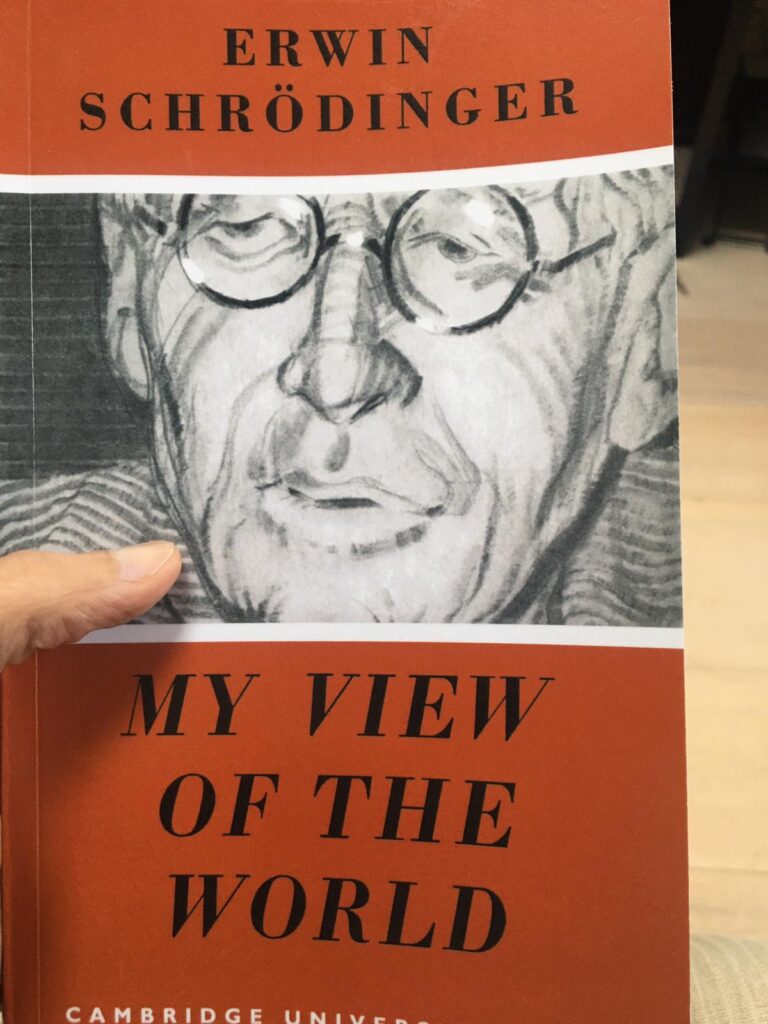
Metaphysics and logic
“A real elimination of metaphysics means taking the soul out of both art and science, turning them into skeletons incapable of any further development”
That to grasp the basis of phenomena through logical thought may in all probability be impossible, since logical thought is itself a part of phenomenon.
No Self stands alone. Behind it stretches an immense chain of physical and —as a special class within the whole —mental events, to which it belongs as a reacting member and which it carries on.
To divide of multiply consciousness is something meaningless. In all the world, there is no kind of framework within which we can find consciousness in the plural; this is simply something we construct because of the spatio-temporal plurality of individuals, but it is a false construction.
Why, I ask, is it precisely at the level of my body that unitary self-consciousness comes into the picture, whereas the cell and the organ do not as yet possess it and the state possesses it no longer?
We asked to believe..if it [consciousness in higher mammals] had not emerged, the world would have remained nothing but a drama played to an empty house, not present *to* anyone and hence not in the real sense present at all.
[comparing to ants] ..an animal which advances to the building of cities without abandoning egotism will not survive; hence only those builders of cities who achieve this transformation will continue to exist.
Perception and the world
I only get to know the external world through my sense perceptions. It is only through them that such knowledge flows into me; they are the very material out of which I construct it.
It is impossible to have so much as a completely certain, unambiguous mutual understanding between human beings; it is a goal which we are forever approaching, but which we never reach. On this ground alone exact science is never really possible.
..we can, at best, reach understanding about the structure of the world grasped by sense, but not about the quality of the units of which it consists.
..the acceptance of a really existing material world, as the explanation of the fact that we all find in the end that we are empirically in the same environment, is mystical and metaphysical.”
7 October 2020: Corporate bureaucracies
If you must work in a corporate bureaucracy, don’t forget that those at the top are better at politics and CYA than anything else. Better to manage your expectations. Better still, is to find a way out.
5 October 2020: Closed-minded
When you encounter people that cling to their views with such closed-minded fervour, remember that their whole identity may be invested in it. We may also ask the same question of ourselves: “Am I too invested in something?”
2 October 2020: Human behaviour
“Evolutionary explanations of human behaviour are hard to pin down and can easily become what scientists call, just-so stories” — Nicholas Christakis
16 September 2020: Entropy increasing?
Given massive population growth, interconnectedness, has entropy increased in the global human system compared to say 500 years ago? Given the increased number of possible states, could we say that there are much more ways for things to break/be incoherent than for them to work?
Therefore, any ‘equilibrium’ reached in social systems is inherently more unstable?
15 September 2020: Outsourcing the core
I received a call today with someone trying to sell me generic blog writing services. I couldn’t believe my ears because in my mind it makes no sense. Outsourcing idea generation cannot be a thing, especially if it is linked to the core of your work.
The person with insights on the matter is the one who must write, and that person is the practitioner. It is one thing to get help editing your work, but to outsource the very core of the message is the highest fakery in my view.
7 September 2020: Aesthetic experience
We are aesthetic creatures. To revel in the joy of aesthetic experience is to embrace life itself.
The universe in all its creative-destruction, enormity and subtlety, turbulence and calm, can be said to be quintessentially aesthetic – if only we see it!
4 September 2020: Utopia
The problem with utopian ideals is that many conceptualise things primarily as a class struggle, where *if only* the oppressors are overthrown everything will be resolved.
But, the deeper commonality of the human condition and the human ego are missed. What makes the new-comers so different to the incumbents?
A revolution of consciousness at the individual level is what it would really take, but introspective self-enquiry does not seem to be scalable. Perhaps, tweaking structures to bring out the best in humanity is more realistic. Perhaps, it is a candle that needs to be burnt at both ends…
3 September 2020: The greatest skill?
In a world of complexity, informational opacity and many a smoke screen, perhaps the greatest skill is in finding a sense of peace within oneself. An inner truth and orientation that comes from self-knowledge.
21 August 2020: Halo effect is real
Expertise is domain specific. Just because someone is good at one thing, doesn’t *automatically* mean they are good at another thing (even in related areas). Always verify.
31 July 2020: Heaven and hell
“No tree, it is said, can grow to heaven unless its roots reach down to hell” — C.G Jung
29 July 2020: Limits of knowledge
The human animal’s understanding is limited by the scope of our own perceptual capacities. We can only know, what we can make sense of as humans. To think otherwise is just hubris. After all, we are only slightly more intelligent apes crawling on a rock.
28 July 2020: Mastery
If you truly know your field, then you will not have to *rely* on some piece of paper (certificate/accreditation etc.) to demonstrate your expertise. In fact, it may even be a reverse indicator of skill.
27 July 2020: Back door
Even proving to yourself is just proving to others by the back door — there is still the danger of deriving your self-worth by reference to some arbitrary, external benchmark.
True liberation lies in doing things *for their own sake*. There is nothing to prove, even to yourself.
13 July 2020: Each at their pace
Everyone will go about life at their own pace, as best they can. Remember that it is unkind to ask a man with a broken leg to hurry-up.
12 July 2020: F**k you money
FU money is more about a state of mind than anything else. It is about defining the minimum annual income that *you* need to live. The lower your personal minimum, the more flexibility you will have.
Ultimately, there is always some trade-off between freedom and comfort/security (unless you make it big). And, any savings you have can help fund the transition into your independent life, if you are making the leap from traditional corporate employment.
Of course, getting $10 million tomorrow might make things easier, there’s no denying that. But, must we all wait for this? Wealth can help to buy freedom IF you can acquire it, but that may not be possible or necessary.
This reminds me of my ceramicist friend who has a super simple life. She rents a small room with friends in a shared house, works on her own terms to generate the minimum income she needs. And, is very content.
She has FU money.
Okay, but what about savings for a rainy day? Fair question. How heavy is that rain going to be? I suppose all sorts of things can happen in life that we may or may not be prepared for. Or, that we think we are prepared for, but aren’t really. How far does one need to go? I don’t know.
Part of the answer lies in embracing uncertainty, and this is a state of mind more than anything else. Ultimately, this is a deeply personal enquiry. FU money is more a state of mind.
2 July 2020: Whatever a selfish person does
“Whatever a selfish person does, whether it be giving his body to be burned, or giving all that he possesses to the poor, he will still do it in a selfish way of feeling, and with extreme cunning, marvellous self-deception and deception of others” — Alan Watts, Lecture Transcript 1969
28 June 2020: Untangle your mind
“What kind of coaching do you offer, exactly?” is naturally a question I often get. Needless to say, I have offered several answers of the years. In the end, I have distilled what it is all about into the shortest possible form using words. So, here is what my coaching is about using one, two and three words:
1. Clarity
2. Unblocking yourself
3. Untangling your mind
Of course, these are all saying the same thing, but each emphasises a slightly different aspect. And, this is exactly what I try to do for myself in my own life.
24 June 2020: Power of talking things through
One thing I’ve learned from my work in different therapeutic domains over the years is the power of talking things through. Whether you are in a career rut or feeling suicidal, the simply act of engaging with another human and being heard has great power. And, it does not even have to be a professional. What matters most is that they are able to hear you with openness and without judgement.
But, be careful whom you open up to. The harsh judgements and “advice” of someone unable to truly hear you out can end-up doing more harm than good.
5 June 2020: Looking within
Working on yourself is both deeply personal and radical. Radical because I have to ask what it means to be human. To introspect and look at who I am. How we are all complex brews of personal experience, narrative and beliefs all meshed together in strange and contradictory ways within a base biology. To look at how I constantly seek to validate myself through all manner of things and to suffer in the process. And, to try and break free of delusion if I can.
But who has the time for that? It’s much easier to point fingers and blame, than to look within.
4 June 2020: Quitting
“No one wanted to accept that I was leaving voluntarily, at least in part because it forced them to look at themselves. If I were not crazy for leaving, then they might have to consider their own sanity in staying” —John Perkins, Confessions of an Economic Hit Man
3 June 2020: Everyone is traumatised
Could it be that we are all traumatised in different ways? First, we must recognise that there is such a thing as post-traumatic growth that we all benefit from. Humans are inherently anti-fragile meaning that we grow from being exposed to stressors, physically and emotionally, in many circumstances. However, modernity also seems to thrust us into many forms of potentially traumatic situations where it is very difficult to say if one is worse than another.
And, it seems to me that there is no self-evident hierarchy of trauma. For example, being physical abused may not necessarily be worse than the fate of a doing a faceless and soul-destroying job for 10 years (though it could be). People react differently to different things. And it’s not easy to say why. The important thing is to recognise suffering when it appears and that there is no hierarchy to human suffering. So, by clinging to arbitrary hierarchies, we only end-up doing a disservice to each other.
What is important is to recognise human suffering wherever it arises and to help each other to heal. And, healing starts by recognising suffering in ourselves.
30 May 2020: Rootlessness
“While unimaginable comforts and opportunities become available as the road to modernisation is traversed…the price paid for freedom from oppressions and restrictions is a kind of rootlessness and insecurity the human species has not previously encountered” — Ellen Dissanayake, Homo Aestheticas
28 May 2020: Looking the demon in the eye
Sometimes our inner demons can feel like charging elephants. Only by daring to calmly look into our minds, and to investigate the very nature of fear can we release ourselves.
23 May 2020: Economy
Modernity’s obsession with “economy” and more for the sake of more, risks elevating indicators of value above the actual things of value. The whole point of “economy” is to support community and human wellbeing. Otherwise, we risk eating the menu thinking that it is the food!
19 May 2020: Dualism
Problem with all dualism is failing to recognise the interdependence of things:
Mind-body
Form-content
Subjective-objective
Good-evil
Knower-known
It is like not being able to have up without down, or in without out. They go together.
14 April 2020: Animal personalities
Apparently, a new study shows that dolphins have personalities. I’ve always felt this about our animal cousins. As Darwin himself noted:
“Courage and timidity are extremely variable qualities in the individuals of the same species, as is plainly seen in our dogs” – The Descent of Man, 1871
Empirical work is finally catching up with what we’ve always intuitively know to be true.
13 April 2020: Your means
Don’t just live within your means. Aim to live well within your means. Remember that you have two levers: your lifestyle and your means. The former is always available to you.
12 April 2020: Myths of modernity
Erroneous beliefs in modernity:
1) Man is separate from nature
2) More is always better
3) Technology will save us
4) Hyper-optimisation is good
5) What is unmeasured doesn’t exist
6) Status brings happiness
11 April 2020: Fear
A personal enquiry into the nature of fear is a fertile area for deeper self-understanding. I find very interesting the interplay between fear related to:
(1) Physical annihilation of the organism; and
(2) Ego’s fear of its own annihilation as a mental construct
As species, we seem to have a tendency to conflate annihilation of the organism with annihilation of the ego’s idea of the way it thinks things “should” be. The two may be different classes of threat, but the fear feels the same to us. Indeed, shame can drive individuals to suicide.
10 April 2020: Turing Test
I worry modernity is heading towards the Turing Test being passed not because we have created machines in our own image, but because we ourselves have become more like machines, such that we don’t know the difference anymore.
9 April 2020: Surprise!
What a lovely message to arrive as a paper aeroplane on our doorstep. Thank you dear, Albert. I will try. You stay safe too.
7 April 2020: Masks? Yes, please.

I love it so much I am wearing it at home. It might just improve my guitar playing too : )
Let’s all wear masks to protect each other.
2 April 2020: Working from home
More and more people are telling me that working from home is actually more intense. It seems that you can very easily end-up on back-to-back calls/meetings without the natural breaks in between (e.g. taxi ride to next meeting). If this intensity is adding to an already hectic work day, you must take great care to avoid burning out.
26 March 2020: The march
To march forward blindly with debt-fuelled, status-seeking consumerism, is a march towards our own destruction. Many blame the system, but few are willing to examine their actions. You may be perpetuating the very thing you claim to hate.
It starts with you.
25 March 2020: We have arrived
We have finally gone all out. The meta position behind government coronavirus inaction is “economy/markets” above “human life”. Modernity has been elevating spurious indicators of value above the actual things of value for a long-time now.
And, this is where it has led us.
22 March 2020: Squeezing life
To frantically strive to squeeze the most out life, is to end-up squeezing the life out of most things.
Achieving anything is really only of any use to those who are already able to savour the beauty of the human experience in its everyday from.
Know your mind
21 March 2020: Uncaring?
Why are so many lax about social distancing ? Has modernity created heartless machines?
Rampant individualism and “ME, ME, ME!” consumerism that blinds us to human suffering? That stops us from caring for each other as a community?
When will we learn, if not now?
20 March 2020: Closed minds
“It is difficult to get a man to understand something, when his salary depends on his not understanding it”- Upton Sinclair
Now true more than ever with the coronavirus “evidence-based” pseudo-experts who just REFUSE to understand the need for precautionary action under huge uncertainty.
19 March 2020: Unexpectedly better?
If self-isolating has unexpectedly increased the quality of your life, this is very important information. Information that business as usual isn’t working very well for you.
Notice it. Change it.
17 March 2020: Pause
Sometimes, it’s okay to do nothing.
To pause and to contemplate. To just be with your thoughts and feelings.
We are so busy ‘achieving’ and seeking external results that we forget to notice our inner experience.
Listen to it. It is a fertile space.
16 March 2020: For its own sake
He who is always trying to get something from everything, will never be satisfied with anything. In the end, contentment and beauty are to be found in the experience of things for their own sake.
13 March 2020: Optimisation
Some one was talking about ‘optimisation and bean counters being the root of all evil’. This is certainly endemic in modernity. I feel the deeper root though is the human (ego) desire for more and more measurable control and certainly over everything (accelerating since the Enlightenment) and culminating with where we are today today in modernity. The result: Control obsession that stifles organic volatility, promotes anxiety and existential doubt. This is Machine Ego.
12 March 2020: Coming undone
I feel like I am watching the undoing of ‘western’ civilisation with coronavirus. Why are governments so slow to act? Are European governments suffering from a kind of hubris and arrogance linked to:
1) An illusion of control reliant on “evidence based” behaviourial pseudo-science
2) thinking they are “better” than rest of world
10 March 2020: Isolated egos in bags of skin
Words that have had a deep impact on me. From the masterful Alan Watts
“Every individual is an expression of the whole realm of nature, a unique action of the universe..Even those who know it to be true in theory do not sense or feel it, but continue to be aware of themselves as isolated ‘egos’ in bags of skin” – AlanWatts, The Book on the Taboo against Knowing who You are, 1966
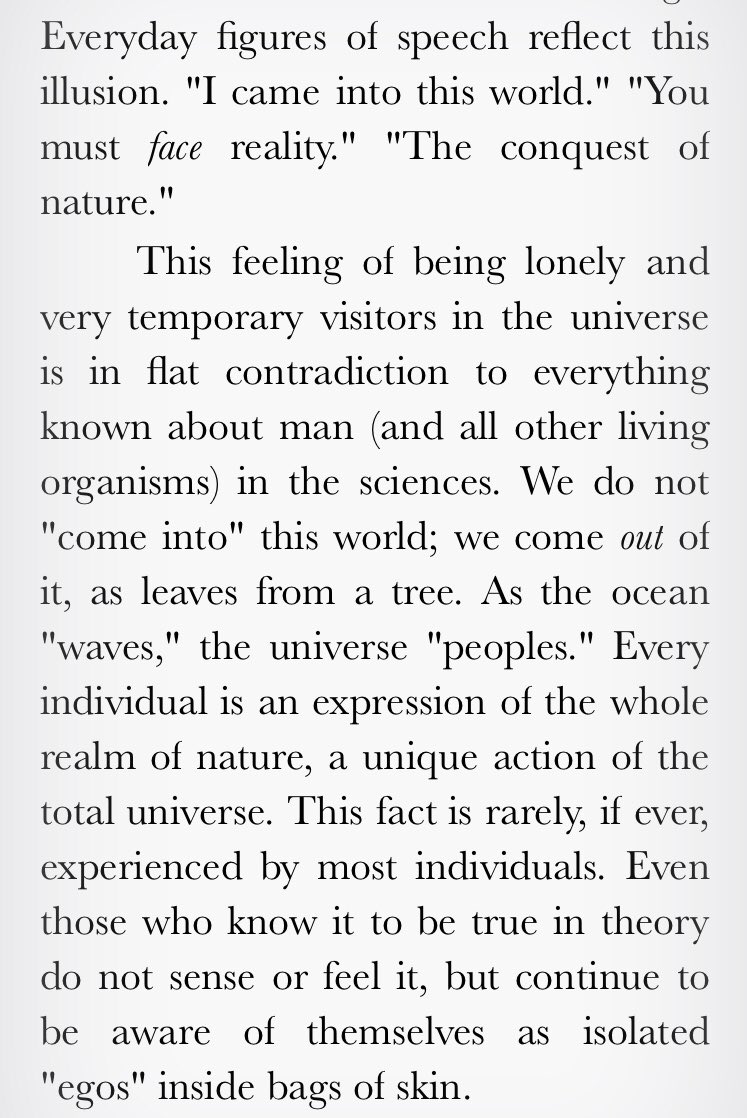
9 March 2020: Silver lining?
If Covid19 has a silver lining, it is in highlighting the fragility of our hyper-connected global systems with no circuit breakers, and how they are dangerously in the hands of bureaucrats with no skin in the game. Perhaps this is nature sending us a wake up call!
7 March 2020: I
We often seek knowledge about the world —what we can learn about something and how it will be of use to us in pursuing our goals. But, how often do you stop to really learn about yourself? To explore your relationship with the person that you call, “I”?
4 March 2020: Spurious
Modernity so often elevates spurious indicators of value above the actual things of value themselves.
-Grades and diplomas above passion and scholarship
-Political correctness above genuine discourse
-External status achievement above inner fulfilment
-Material and technological growth above human wellbeing
-Sterile over-intellectualisation above direct feeling and expression
1 March 2020: Feeling invigorated!
A super 5 days of probability, complexity and real word risk at RWRI! What a privilege to learn from practitioners with such soul in the game and humility. For me, it was like a meditation on uncertainty and the very nature of empirical reality. Gratitude to all those who shared their knowledge and skills: Nassim Taleb, Raphael Douadi, Robert Frey, Joe Norman and others. And, to all the participants from so many diverse fields that made the week all the more interesting!
28 February 2020: Phenomenology vs theory
It is more important to know IF the thing works, not what the mechanism is. Because theories of how exactly the thing works may change over time – Nassim Taleb.
We can spend far too much time distracted with theorising the mechanism behind the effect, forgetting that it is more important to be able to recognise and re-produce the effect, whatever (hidden) mechanism may be involved! A good example of this is those who try to deconstruct mindfulness with pseudo-theories using “neuroscience”, whilst forgetting something fundamental. That of the very direct felt experience of mindful states and how this relates to the nature of attention.
24 February 2020: Day 1 of Real World Risk Institute
Super excited to be attending Nassim Taleb’s RWRI to dive into ideas around anti-fragility, scale and complexity so relevant to our modern lives.
Here Nassim is showing us how randomness often does not look random!
14 February 2020: Complexity vs. scale
Currently reading “Making Things Work” by Yaneer Bar-Yam and noticing just how much we face the trade-off between large scale behaviour and fine scale complexity in how groups and organisations are set-up.
“When parts are acting independently, the fine scale behaviour is more more complex. When they are working together, the fine scale complexity is much smaller, but the behaviour is on a larger scale. This means that complexity is always a trade-off, more complex at a large scale means simpler at a fine scale” – From Making Things Work.
6 February 2020: Edge of the known
Came to the realisation during lunch with my friend Lorenzo, the mathematician/physicist/computer-scientist, that quantum physics and the practice of science more generally can be a sort of spiritual practice. Because such enquiry can take the practitioner to the very edge of the known — towards a feeling of deep connection with the wider world beyond the confines of the ego-centric self. I suppose many roads can lead to the same place. Indeed, many spiritual and philosophical traditions have described such understanding by different names: Advaita (non-duality) in Vedanta, Tai Ji (supreme ultimate) in Chinese philosophy, Anatta (no-self) in Buddhism, Schopenhauer’s Will and Nietzsche’s Primordial Unity. I believe that music and art too can take us to a similar depth of feeling and understanding.
5 February 2020: Self-proclaimed Gurus
Just finished listening to Russell Brand interview Byron Katie on his podcast, UndertheSkin. I was appalled by how new age gurus such as Katie claim to be “enlightened” and in effect deny the biological-cultural force of the human ego. And, how the ego can pull us ALL towards suffering. People like Byron Katie who put themselves on pedestals concern me a great deal. Because by not acknowledging how the complexity of life in modernity can so very easily create ego-based suffering, they run the risk of disempowering others. Disempowering them by pedalling the idea that “enlightenment” is some pinnacle to be reached in a far off place accessible to a select few. Enlightenment (if there is such a thing) is more a path, rather than a destination.
Much credit to Russel for his spiritual honesty and for his willingness to share his own struggles. Doing great work mate!
30 January 2020: Street smart
Reflection of the day: What do a Zen master and a mafia don have in common? Both are not ‘suckers’ prone to naivety. Both are frequently considered to be ‘stupid’ by pseudo-intellectual types (the real suckers or whom Taleb refers to as IYIs – intellectual yet idiots).
26 January 2020: Self-work

And, no catch-up is complete without a jamming session!
23 January 2020: The nature of love
“You do not cling to one another as to commit mutual strangulation.You are not each other’s chattels, and you must trust your partner to allow full freedom to be the being that he and she is” – Alan Watts, In my own way (1972)
19 January 2020: Artisanal life
The independent / artisanal life is not so much about what you do, as it is about doing whatever YOU want to do. Society may sell the sterile “safety” of big corporate bureaucracies, but this comes with huge cost to human wellbeing . Intellectual and creative freedom is priceless.
25 October 2019: Reason
Just finished the hugely insightful Enigma of Reason (2017) by the pioneering psychologists, Hugo Mercier and Dan Sperber.
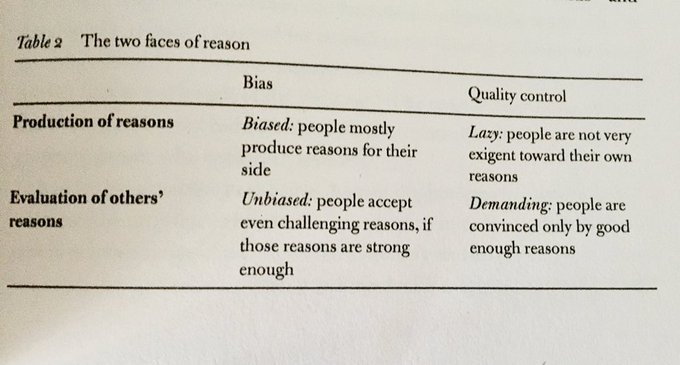
(i) Dialogic approach, discussion, debate
(ii) introspection
Authors make a compelling case that convincing others is the proper, evolutionary domain of reasoning, highlighting the lower effectiveness of solitary reasoning. In my mind, this makes deeper self-awareness and self-understanding even more necessary as we are pre-disposed to being lazy when evaluating our own minds.
Reason understood as a tool for social interaction and social consumption also explains why reasoning can drive people towards decisions that are easier to JUSTIFY, whether or not they are otherwise good decisions. Just think of corporate, cover-your-ass environments, where the “safe” option for which you are least likely to get fired is typically favoured over more creative alternatives. A problem made worse by empty suits with no skin-in-the-game being in managerial positions.
17 October 2019: Human connection
Is modern life too “Anonymous-transactional”? A problem related to scale, tech and connectivity. Our total number of daily interactions (emails, calls etc.) can be huge, but the average time spent per person tiny. Different to hunter-gatherer or village communities, where one would expect a large number of interactions with a small group. Allowing a chance to form deeper, more meaningful human connections.
16 October 2019: We are not automata
Psychiatry and much of psychology still operate from the mechanistic view of the human as an isolated automata. Assuming that what is wrong has arisen independently within the person and disregarding environmental factors. This is truly a tragedy.
15 October 2019: Being the author of your life

And, it is fear and hidden conditioned beliefs that stop you. The often non-conscious feeling that you are ‘not allowed’ to deviate from some script of how you feel you ‘should’ be. Only by looking into your mind and the nature of its (hidden) fear can you hope to break free. Only by challenging the non-conscious narrative that is at play can you have real authorship of your life.
Artwork by Douglas Gordon
10 October 2019: Whose got THE answer?
In the opaque realms of human behaviour (mind + body) and socio-economic interaction (group behaviour), the more someone claims to have THE answer, the more suspicious you should be of them. It is better to say “I am not sure” rather than to create a false narrative. Complexity and causal opacity are very real.
3 October 2019: What is life about?
Life is about problem solving, but life itself is not a problem to be solved.
9 September 2019: Creativity deficit
This chart from Rory Sutherland’s latest book, Alchemy, sums up the deficit of creative thinking in large organisations. “It is much easier to be fired for being illogical than for being unimaginative”
16 August 2019: Life and spirituality
I find this quote by the artist Lee Krasner to be true of so much in life:
“You can have giant physical size with no statement on it and vice versa. You can have a tiny painting which is monumental in scale.”
12 May 2019: Programmed?
Seeing this art-piece made me think of how we can so easily get locked in doing soul-destroying work. How we can keep ourselves stuck in situations of psychological pain and constant stress, as we chase externally “programmed” ideas of success. Our human conditioning may be strong, but it is not final. We have the ability to break free. We have the ability to actively choose different paths that serves us better. But, we have to find the courage within ourselves to do so!
Artwork: “Can’t help myself” by Sun Yuan and Peng Yu. Displayed at La Biennale di Venezia 2019
Life and spirituality journal post, 16 August 2018: Falling over

Sometimes, you need to slow down and take a step back. If you do not allow yourself the time to focus on what really matters to you, chances are that you will keep running (and falling over) for somebody else.
Artwork by Yinka Shonibare
Life and spirituality journal post, 9 August 2018: Letter from Anna Freud
I believe these words by Anna Freud, written for an aspiring psychotherapist, to be true for coaching and every other field concerning human development.
“Dear John
You asked me what I consider essential personal qualities in a future psychoanalyst. The answer is comparatively simple. If you want to be a real psychoanalyst you have to have a great love of the truth, scientific truth as well as personal truth, and you have to place this appreciation of the truth higher than any discomfort at meeting unpleasant facts, whether they belong to the world outside or to your own inner person.
Further, I think that a psychoanalyst should have interests beyond the limits of the medical field in facts that belong to sociology, religion, literature and history, otherwise his outlook on his patient will remain too narrow. This point contains the necessary preparation beyond the requirements made on candidates of psychoanalysis in the institutes. You ought to be a great reader and become acquainted wth the literature of many countries and cultures. In the great literature figures you will find people who know at least as much of human nature as the psychiatrists and psychologists try to do.
Does that answer your question?
Yours sincerely
Anna Freud

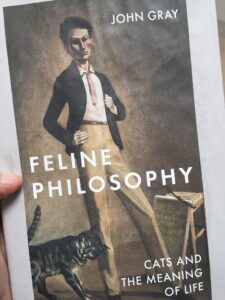 31 October 2020: What we can learn from cats
31 October 2020: What we can learn from cats